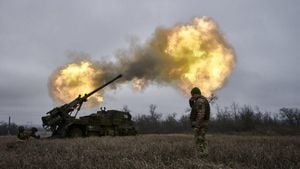Nepal's Prime Minister, K.P. Sharma Oli, is embarking on what can be described as a pivotal moment for the tiny Himalayan nation as he seeks to strengthen economic ties with neighboring China. This marks his fourth term in office, and his recent choices reveal significant strategic shifts, especially as he opts to visit China instead of India first after taking office.
Arriving in Beijing on December 2, 2024, for what is expected to be a four-day visit, Oli’s actions signify more than just political courtesy; they represent Nepal's ambition to redefine its economic dependencies. Traditionally, Nepal has been heavily reliant on India for trade and economic support, with India accounting for two-thirds of the nation's international trade. This historic relationship is now being reconsidered as Nepal seeks to broaden its economic horizons.
During his meeting with Chinese President Xi Jinping on December 2, Prime Minister Oli received firm commitments of support aimed at transforming Nepal from being landlocked to land-linked, enhancing its connectivity with regional and global markets. Xi reiterated China's strong commitment to support Nepal’s economic development, stating it would do so "to the best of its ability," according to statements released by Chinese state media. Given the continuing international focus on China’s ambitious Belt and Road Initiative—aimed at fostering infrastructure and trade links across Asia and beyond—Oli's government appears eager to capitalize on this monumental program.
So far, the Nepalese government has signed nine agreements with China, largely reiterations of prior commitments rather than new projects, which has raised concerns back home about the effectiveness and implementation of earlier initiatives. Since signing up for the Belt and Road Initiative back in 2017, Kathmandu has yet to see groundbreaking on any projects, which has drawn skepticism about the viability of the agreements moving forward.
Oli's push to deepen ties with China is underscored by more than just diplomatic exchanges; it aims to reduce Nepal’s extensive reliance on India. While India is Nepal's primary trading partner, China is slowly increasing its footprint, particularly as it extends credit and investment. Reports from the World Bank indicate China has emerged as a larger creditor, extending over $310 million to Nepal, which surpasses India's financial assistance. This rebalancing is not merely quantitative; it also signifies Nepal's strategic shift to strengthen its own sovereignty and economic independence.
Historically, the relationship with India took a downturn after New Delhi’s six-month oil blockade on Kathmandu just prior to Oli's initial term. That blockade, which stopped fuel supplies during unrest, prompted the then-prime minister to seek alternative arrangements, leading to the signing of petroleum deals with China. This marked a significant departure from exclusive reliance on India, as it allowed Nepal to diversify its economic partnerships.
Nonetheless, with China’s loans come significant concerns. There is increasing apprehension among various political factions within Nepal’s coalition government about the sustainability and potential risks associated with large-scale borrowing. The Nepali Congress party, one of the primary supporters of Oli, has voiced strong opposition to funding projects through loans. Instead, they recommend focusing on grants to mitigate any future financial distress. This concern stems from global examples, such as Sri Lanka's recent default on foreign debt, which serves as cautionary guidance for economists and state officials alike.
The dynamics surrounding major infrastructure projects also deserve scrutiny. For example, construction of the new international airport in Pokhara, funded with a Chinese loan of $216 million, started only recently and has faced its own set of challenges. There is presently limited international traffic to the airport, largely due to India restricting its airspace for flights to Pokhara. The hope for this airport to serve as China's Belt and Road Initiative success story has been met with operational hurdles, dampening optimism about the project's viability.
Therefore, as Oli navigates this delicate balancing act—securing necessary aid from China, reducing dependence on India, and addressing mounting debt concerns—he faces significant challenges. Yet the Chinese leadership's willingness to support Nepal also brings opportunities to reposition the country on the regional stage. Managing this complex relationship will be key to Oli's administration as he seeks to deliver on promises of progress and development.
Looking forward, all eyes will be on how Nepal’s relationships evolve, especially as regional dynamics and global markets fluctuate. With China’s influence growing across Asia, Nepal's choices today could be implementing long-lasting shifts not just for its own economy, but potentially for the broader geopolitical framework within the region.



